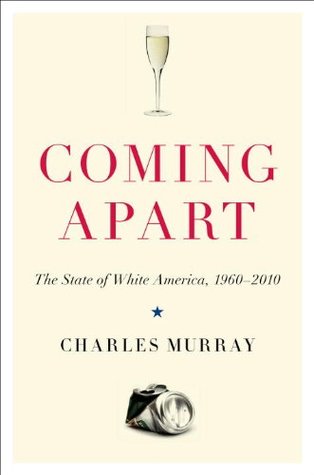More on this book
Kindle Notes & Highlights
Read between
September 20 - September 20, 2016
The empirical relationships that exist among marriage, industriousness, honesty, religiosity, and a self-governing society mean that the damage is done, even though no one intends it.
“Kids are more challenging, [with] less fear of consequences. Parents have given power to children and this is destructive.… Parents feel they are getting what they deserve … ‘I’m a rotten parent, I’m at work, and all sorts of excuses, so this is why I must deserve this.’ ”
Happiness consists of lasting and justified satisfaction with life as a whole. The definition in effect says that when you decide how happy you are, you are thinking of aspects of your life that tend to define your life (not just bits and pieces of it); that you base your assessment of your happiness on deep satisfactions with the way things have gone, not passing pleasures; and that you believe in your heart of hearts that those satisfactions have been worth achieving.
Once you start to think through the kinds of accomplishments that do lead people to reach old age satisfied with who they have been and what they have done, you will find (I propose) that the accomplishments you have in mind have three things in common. First, the source of satisfaction involves something important. We can get pleasure from trivial things, but pleasure is different from deep satisfaction. Second, the source of satisfaction has involved effort, probably over an extended period of time. The cliché “Nothing worth having comes easily” is true. Third, some level of personal
...more
There aren’t many activities in life that satisfy the three requirements of importance, effort, and responsibility. Having been a good parent qualifies. Being part of a good marriage qualifies. Having done your job well qualifies. Having been a faithful adherent of one of the great religions qualifies. Having been a good neighbor and good friend to those whose lives intersected with yours qualifies. But what else?
If we ask what are the domains through which human beings achieve deep satisfactions in life—achieve happiness—the answer is that there are just four...
This highlight has been truncated due to consecutive passage length restrictions.
The alternative to the Europe Syndrome is to say that your life can have transcendent meaning if it is spent doing important things—raising a family, supporting yourself, being a good friend and a good neighbor, learning what you can do well and then doing it as well as you possibly can. Providing the best possible framework for doing those things is what the American project is all about. When I say that the American project is in danger, that’s the nature of the loss I have in mind: the loss of the framework through which people can best pursue happiness.
In keeping with its democratic tradition, America did not have different codes for socioeconomic classes.11 To be a decent person was to adhere to a code that applied to all, rich and poor.
The United States is one of the richest countries on earth. Most Americans—the precise percentage will vary depending on one’s definition of “enough”—make enough money for themselves and their families that the entire welfare state could be dismantled tomorrow and they would do just fine. And yet in 2002, as I was writing In Our Hands, the federal government alone spent about $1.5 trillion in transfer payments, including Social Security, Medicare, and all forms of corporate welfare. The states spent another few hundred billion dollars in transfer payments. And yet we still had millions of
...more


